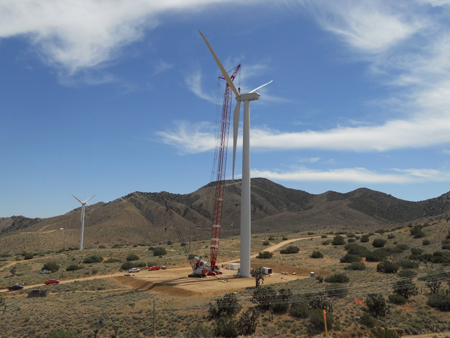After months of locking horns with the United States, China has agreed to stop a subsidy program aimed at getting wind power manufacturers to use Chinese-made parts, rather than import them from countries like the U.S.
Late last year, the United States filed a formal complaint with the World Trade Organization (WTO) claiming China was in clear violation of WTO rules and regulations by providing subsidies to wind power equipment manufacturers who agreed to use key parts and components made in China rather than buying imports. In the case of such a dispute, the WTO process stipulates that the two quibbling parties hash out their differences on their own. If after two months the issue isn’t settled, a dispute panel could be convened at the United States’ request.

Not surprisingly, China stuck to its story, claiming that what it was doing was well within WTO rules. The Obama administration pushed back, calling for the dispute panel to intervene. Now, almost four months later, U.S. Trade Representative (USTR) Ron Kirk is announcing that China folded and has ended its shifty wind-power subsidies program.
According to Kirk’s office, this is third time the U.S. has leveraged a challenge against Chinese government subsidies and won. This most recent challenge was brought about via a mammoth-sized petition filed by the United Steelworkers which was apparently loaded with evidence that showed massive job loss in the U.S. due to China’s subsidy practices. Leo W. Gerard, the International President of the United Steelworkers (USW) issued a statement applauding the Obama administrations vigilant pursuit of their complaint but called attention to the fact that there was much more work to be done saying, “We need continued action on our other complaints in our petition to ensure that China’s protectionist and predatory practices in the clean tech energy sector are eliminated.”
A severe lack of transparency on the part of the Chinese government is blamed for the need of a deep investigation on the part of the USTR It is estimated that the “grants” the Chinese government provided to Chinese companies since 2008 may total up to several hundred million dollars. The investigation indicates individual grants ranged between $6.7 million and $22.5 million.
The USTR says that, under WTO rules, China is obligated to submit information about all of its subsidy programs and do so on a regular basis, as is the case for all WTO members. Despite this obligation, China reportedly avoided notifying the WTO of the wind power equipment subsidies, a practice China seems to be plenty comfortable with since China also failed to submit notifications for dozens of other subsidies which the U.S. challenged in two prior disputes. In fact,according to the USTR, China has submitted only one subsidies notification since becoming a WTO Member in December 2001 and that came about 5 years later than it should have.
For several years, the United States was the global wind power leader, but China surpassed the U.S. in total wind power capacity during 2010.